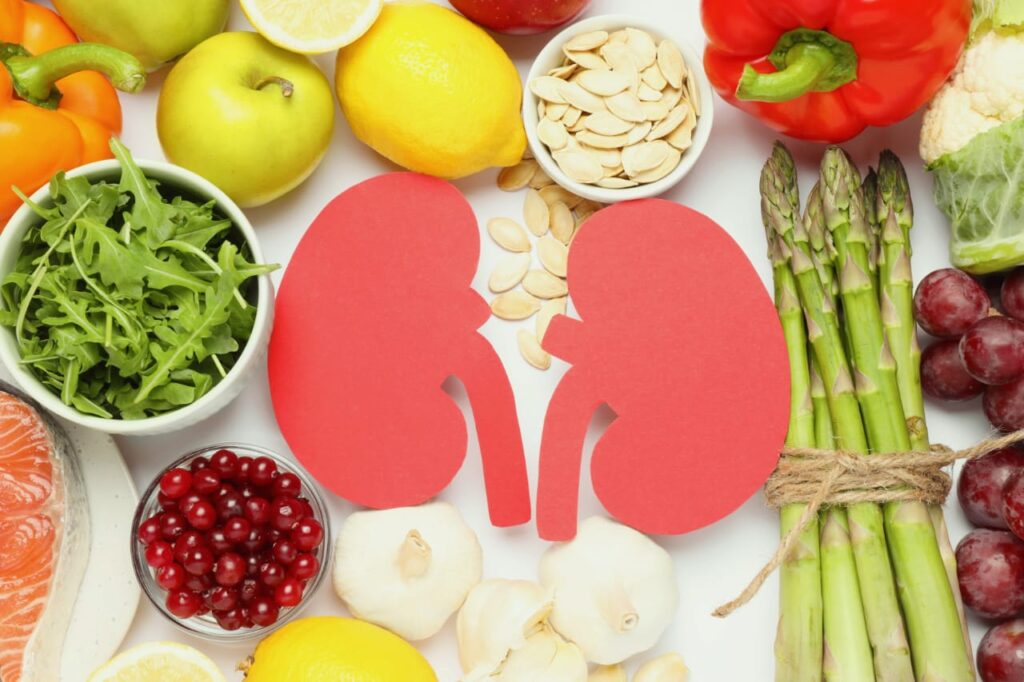Foods to Include in a Diet for Kidney Disease
When managing kidney disease, it is essential to choose foods that minimize strain on the kidneys while ensuring you receive adequate nutrition. Here’s a breakdown of foods that can benefit kidney health:

1. Low-Potassium Fruits
Potassium levels must be carefully monitored in individuals with kidney disease. These fruits are lower in potassium and safe to consume in moderate amounts:
- Apples
- Blueberries
- Grapes
- Pineapples
- Strawberries
These fruits provide antioxidants and essential vitamins without overloading potassium levels, helping to maintain balanced kidney function.
2. Vegetables with Low Potassium
Not all vegetables are kidney-friendly. Opt for these low-potassium options:
- Cauliflower
- Cabbage
- Bell peppers
- Asparagus
- Radishes
Steam or roast these vegetables to preserve their nutritional content while enhancing flavor.
3. High-Quality Protein Sources
While protein is vital for muscle maintenance and repair, too much protein can burden the kidneys. Choose high-quality, low-quantity protein sources such as:
- Skinless chicken breast
- Egg whites
- Fish like salmon (rich in omega-3 fatty acids)
- Tofu
For those with advanced kidney disease, protein intake should be closely monitored by a healthcare provider.
4. Healthy Fats
Fats can provide a significant energy source for individuals with kidney disease. Incorporate healthy fats like:
- Olive oil
- Avocado oil
- Unsalted butter in moderation
These fats are heart-healthy and less taxing on the kidneys compared to saturated fats.
5. Grains and Cereals
Whole grains can be high in phosphorus, which may not be suitable for individuals with kidney disease. Instead, consider refined grains like:
- White rice
- White bread
- Cornflakes
These options have lower phosphorus content but still provide necessary energy.
Foods to Avoid in a Diet for Kidney Disease
Certain foods can exacerbate kidney damage or worsen symptoms. Avoid these items to help your kidneys function optimally:
1. High-Potassium Foods
Excess potassium can build up in the blood, leading to dangerous health complications. Limit or avoid:
- Bananas
- Oranges and orange juice
- Tomatoes and tomato-based products
- Potatoes (or soak them to reduce potassium)
- Avocados
2. High-Phosphorus Foods
Phosphorus can weaken bones and strain the kidneys. Avoid foods like:
- Dairy products (milk, cheese, yogurt)
- Nuts and seeds
- Chocolate
- Processed and packaged foods with added phosphorus
3. Sodium-Rich Foods
Too much sodium can increase blood pressure and worsen kidney function. Common culprits include:
- Table salt
- Canned soups
- Processed meats (bacon, sausage)
- Frozen meals
- Condiments like soy sauce and salad dressings
Opt for fresh, unprocessed ingredients and season with herbs and spices instead of salt.
4. Sugary and Processed Foods
Sugary snacks and beverages contribute to weight gain and diabetes, both of which can worsen kidney disease. Avoid:
- Soda
- Candy
- Pastries
- Energy drinks
Key Nutrients to Monitor in a Kidney Disease Diet
1. Sodium
Limiting sodium is critical to preventing fluid retention and hypertension. Aim for less than 2,000 mg per day or as advised by your doctor.
2. Potassium
Potassium intake should match your kidney function level. Blood tests can determine if you need to reduce potassium in your diet.
3. Phosphorus
Many patients with kidney disease need to limit phosphorus. Use phosphorus binders if prescribed and avoid high-phosphorus foods.
4. Protein
Protein needs vary based on the stage of kidney disease. Early stages may require moderate protein, while advanced stages often call for significant restriction.
5. Fluids
If you have advanced kidney disease or are on dialysis, fluid restrictions may be necessary. Monitor your intake of water, coffee, tea, and other beverages.
Sample Meal Plan for Kidney Disease
Here’s a practical meal plan tailored for kidney disease:
Breakfast
- Scrambled egg whites with fresh herbs
- White toast with unsalted butter
- A small bowl of blueberries
- Herbal tea or black coffee (unsweetened)
Lunch
- Grilled chicken breast
- Steamed cauliflower and bell peppers
- White rice
- Freshly squeezed lemon water (no added sugar)
Snack
- Apple slices with a small dollop of peanut butter (unsalted, in moderation)
Dinner
- Baked salmon with olive oil and dill
- Roasted asparagus
- Mashed potatoes (soaked and prepared with no added salt)
- Unsweetened iced tea
Evening Snack
- Strawberries with a sprinkle of cinnamon
Special Considerations for Different Stages of Kidney Disease
Early-Stage Kidney Disease
For those in the early stages, maintaining a heart-healthy diet is often sufficient. Focus on reducing sodium and incorporating more plant-based foods.
Advanced Kidney Disease
When kidney function declines, restrictions become more critical. Protein, potassium, phosphorus, and fluid intake must be closely monitored. Work with a renal dietitian to create a personalized eating plan.
On Dialysis
Dialysis patients often need increased protein to replace losses during treatment but must still limit potassium and phosphorus. Adhere to your dialysis center’s dietary guidelines for best results.
Practical Tips for Managing a Kidney-Friendly Diet
- Plan Your Meals: Preparing meals in advance can help you avoid high-sodium, high-potassium processed foods.
- Read Labels: Look for sodium, potassium, and phosphorus content on food labels. Avoid anything with “phosphate” additives.
- Use Alternatives: Substitute salt with herbs and spices like basil, oregano, or lemon juice for flavor.
- Hydration: If fluids are not restricted, drink water instead of sugary drinks.
- Consult Experts: Regular consultations with a renal dietitian or healthcare provider can ensure your diet evolves with your condition.
This comprehensive guide can help individuals with kidney disease make informed dietary choices. A personalized approach, along with medical advice, ensures the best possible management of the condition.
